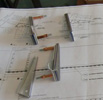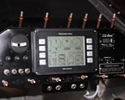


random user submitted photo
Lithium Battery Fire (Australian Accident)
8 posts
• Page 1 of 1
Lithium Battery Fire (Australian Accident)
The following accident investigation was performed by the Australian Transport Safety Administration regarding a thermal runaway and aircraft fire in a Jabiru J170 airplane. The report is worth a read, and brings up some things to consider regarding using lithium batteries in our planes.
https://www.atsb.gov.au/publications/oc ... -2018-124/
Reading through the report, two conclusions come to mind. First, lithium batteries are not tolerant of deep discharge. Should this happen, there is a good possibility of cell damage that will permanently alter the stability of the battery, even if it doesn't kill it outright. I think a pilot would do well to be suspicious of a "rescued" battery, and at the first sign that the battery was no longer performing as expected should retire the battery. The risk of fire just isn't worth it.
Second, the internal cell chemistry that makes lithium so good at delivering large currents, means that they can potentially place a huge strain on the engine alternator (for us, typically permanent magnet alternators like the Jabiru and AeroVee use). This unusually-high demand on the alternator might damage the regulator, causing excessive charge voltage. The instruments in you panel will probably be OK with 15 volts from the regulator, but your lithium battery will absolutely not handle it. That's what happened in the J170's case, and the over-voltage condition initiated the thermal runaway, an inflight fire, and near fatal emergency landing. It happened so fast the pilot barely got the plane to the ground, while his clothes burned on his body, then jumped out while the plane was still airborne. Scary stuff. Over-voltage protection (crowbar type) is a must.
It's important to point out the brand of battery this pilot was using (Deltran) was not EarthX like we typically use, and may not of had any built-in battery management system (BMS) to prevent over-discharge or excessive charging voltage. Those features certainly will help prevent massive abuse, and I personally wouldn't consider flying with a lithium battery without a BMS. Even so, I wouldn't fly behind a lithium battery of any variety without a crowbar OV system installed in the plane.
Once upon a time lead acid batteries had a problem with exploding, but that got sorted out. Now they are so good we can abuse them to no end, and they just keep going. Lithium batteries are getting better, but they still need a delicate touch and a bullet proof electrical system. If you're going to use them, you need to do it right.
Jeff
https://www.atsb.gov.au/publications/oc ... -2018-124/
Reading through the report, two conclusions come to mind. First, lithium batteries are not tolerant of deep discharge. Should this happen, there is a good possibility of cell damage that will permanently alter the stability of the battery, even if it doesn't kill it outright. I think a pilot would do well to be suspicious of a "rescued" battery, and at the first sign that the battery was no longer performing as expected should retire the battery. The risk of fire just isn't worth it.
Second, the internal cell chemistry that makes lithium so good at delivering large currents, means that they can potentially place a huge strain on the engine alternator (for us, typically permanent magnet alternators like the Jabiru and AeroVee use). This unusually-high demand on the alternator might damage the regulator, causing excessive charge voltage. The instruments in you panel will probably be OK with 15 volts from the regulator, but your lithium battery will absolutely not handle it. That's what happened in the J170's case, and the over-voltage condition initiated the thermal runaway, an inflight fire, and near fatal emergency landing. It happened so fast the pilot barely got the plane to the ground, while his clothes burned on his body, then jumped out while the plane was still airborne. Scary stuff. Over-voltage protection (crowbar type) is a must.
It's important to point out the brand of battery this pilot was using (Deltran) was not EarthX like we typically use, and may not of had any built-in battery management system (BMS) to prevent over-discharge or excessive charging voltage. Those features certainly will help prevent massive abuse, and I personally wouldn't consider flying with a lithium battery without a BMS. Even so, I wouldn't fly behind a lithium battery of any variety without a crowbar OV system installed in the plane.
Once upon a time lead acid batteries had a problem with exploding, but that got sorted out. Now they are so good we can abuse them to no end, and they just keep going. Lithium batteries are getting better, but they still need a delicate touch and a bullet proof electrical system. If you're going to use them, you need to do it right.
Jeff
- sonex1374
- Posts: 605
- Joined: Thu Mar 27, 2014 1:02 am
Re: Lithium Battery Fire (Australian Accident)
Like so many others, I’d love to have the weight savings but at this point I don’t consider the risk worth it. Maybe in a few years once things are more sorted out.
Mike Farley
Waiex #0056 - N569KM (sold)
Onex #245
Waiex #0056 - N569KM (sold)
Onex #245
- MichaelFarley56
- Posts: 1485
- Joined: Thu Jun 02, 2011 11:38 pm
- Location: Columbus, Ohio
Re: Lithium Battery Fire (Australian Accident)
That’s one possible conclusion from this report. I would suggest an alternative, which is understand how to care for and operate your electrical system, including but not limited to the particular battery you choose. And, regardless of battery type, over-voltage protection from the alternator is well advised.
Lithium Iron batteries can be and are operated safely with mostly the same precautions as lead acid batteries. ALL batteries contain a lot of energy and will become dangerous if mis-treated.
Gordon
Lithium Iron batteries can be and are operated safely with mostly the same precautions as lead acid batteries. ALL batteries contain a lot of energy and will become dangerous if mis-treated.
Gordon
Waiex 158 New York. N88YX registered.
3.0 Liter Corvair built, run, and installed.
Garmin panel, Shorai LiFePo batteries.
3.0 Liter Corvair built, run, and installed.
Garmin panel, Shorai LiFePo batteries.
- GordonTurner
- Posts: 669
- Joined: Tue Feb 21, 2012 1:14 am
- Location: NY, NY
Re: Lithium Battery Fire (Australian Accident)
Gordon,
I agree. Still, I can’t help but conclude that lithium chemistry is unforgiving of abuse, far more than anything else in use. Failure to understand the particular requirements of these batteries is a setup for disaster. I hope we can help people understand these issues and use them safely.
Jeff
I agree. Still, I can’t help but conclude that lithium chemistry is unforgiving of abuse, far more than anything else in use. Failure to understand the particular requirements of these batteries is a setup for disaster. I hope we can help people understand these issues and use them safely.
Jeff
- sonex1374
- Posts: 605
- Joined: Thu Mar 27, 2014 1:02 am
Re: Lithium Battery Fire (Australian Accident)
GordonTurner wrote:That’s one possible conclusion from this report. I would suggest an alternative, which is understand how to care for and operate your electrical system, including but not limited to the particular battery you choose. And, regardless of battery type, over-voltage protection from the alternator is well advised.
Lithium Iron batteries can be and are operated safely with mostly the same precautions as lead acid batteries. ALL batteries contain a lot of energy and will become dangerous if mis-treated.
Gordon
Gordon is spot on here. This subject gets kicked around every so often over on the Van's forum and has been discussed ad nauseam.. They are at it once again. The bottom line is to follow the manufactures installation, care, and maintenance instructions to the letter,,,and that in addition to the batteries built in BMS, crowbar over voltage protection is mandatory.
https://earthxbatteries.com/shop/etx900
David Clifford
Howell & Gladwin, MI
RV-9A: Under Construction (I'm a repeat offender!)
RV-10: Built & Sold: Flying Since 2013 N959RV
Cozy MKIV: Built & Sold: Flying Since 2007 N656TE
Howell & Gladwin, MI
RV-9A: Under Construction (I'm a repeat offender!)
RV-10: Built & Sold: Flying Since 2013 N959RV
Cozy MKIV: Built & Sold: Flying Since 2007 N656TE
-

9GT - Posts: 58
- Joined: Tue Apr 05, 2016 4:23 pm
- Location: Howell, MI
Re: Lithium Battery Fire (Australian Accident)
The reason i gave up on lithium battery for my Jab / CAMit powered Sonex is that those engines have had re-occurring problems with the flywheel to crank shaft connection and the Earth EX battery I was using gave such a strong starting kick that i was concerned that it would damage that connection. The high charge rate was also a concern, so back to Odyssey, and pilot lost 30 pounds instead.
David A.
David A.
- DCASonex
- Posts: 935
- Joined: Mon Sep 12, 2011 8:04 pm
- Location: Western NY USA
Re: Lithium Battery Fire (Australian Accident)
Just an aside to this topic. The new E-cigarettes have a form of lithium battery in them also. There have been a rash of battery fires in them. A local A&P had his ignite in his pocket. The result was third degree burns requiring skin grafts in a delicate area. I'm told they burn like a rocket motor.
OneX 107
N2107X
N2107X
- Onex107
- Posts: 506
- Joined: Mon Mar 24, 2014 6:44 pm
- Location: Peoria, IL
Re: Lithium Battery Fire (Australian Accident)
Onex107 wrote:Just an aside to this topic. The new E-cigarettes have a form of lithium battery in them also. There have been a rash of battery fires in them. A local A&P had his ignite in his pocket. The result was third degree burns requiring skin grafts in a delicate area. I'm told they burn like a rocket motor.
Every cell phone also has a lithium battery, and you usually carry those in your pocket, too...
The difference is that unlike E-cigarettes they don't basically short the battery in normal operation. On top of that it also seems likely to me that those vaporizers have no battery controls. I've seen battery sellers point out in all caps "DO NOT USE THESE TO VAPE" because you need a cell that can handle at least 20A or something and if you don't use a cell designed for that current then it's likely to overheat. It just seems like another aspect of the "don't abuse your Li battery" rule.
- lutorm
- Posts: 259
- Joined: Mon May 15, 2017 1:35 pm
- Location: The Island of Hawai
8 posts
• Page 1 of 1
Who is online
Users browsing this forum: No registered users and 64 guests







